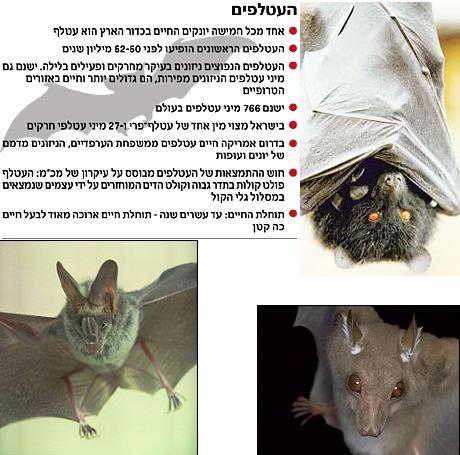The bats on Earth probably evolved in an "evolutionary big bang" about 50 million years ago, in an era of general warming, say scientists.

"Black Comoro" flying fox - a fruit bat that lives in the Comoro Islands
The bats on Earth probably evolved in an "evolutionary big bang" about 50 million years ago, in an era of general warming, say scientists.
These powerful flyers make up about 20% of all mammals, but little is known about their development.
Recently, an international team of researchers managed to trace the history of four of the main bat families, up to the early Eocene era (52-50 million years before our time). In that era, there was a significant increase in the average temperature of the earth - of about 7 degrees Celsius. The warm climate caused many plants and insects to flourish, and the bats developed flying skills and orientation with the help of resonance (a principle of operation of radar) to hunt them, the researchers claim.
In the last issue of the journal "Science" Emma Tilling and her colleagues from University College in Dublin Ireland reported that it is probable that the origin of bats is from "Eurasia", or the Northern Hemisphere, most likely the area that is now known as North America.
"As flying carnivores, few rivaled them for the rich food sources of the Oceanic night," wrote Nancy Simmons of the American Museum of Natural History in New York, in an editorial accompanying the publication of the study.
Modern bats are classified into 18 families, based on anatomical structure and echolocation.
"Mega-bats" are large, live in the tropics, feed
Fruits and flies during the day. Smaller and more common "micro-bats", feed on insects and use resonance to locate their prey at night.
The researchers used the DNA of modern bats to determine the evolutionary relationships between the "mega-bats" and "micro-bats".
The results of the study support the theory that "mega-bats" evolved from four main families of "micro-bats".
"The study advances our understanding of the origins of bats, when and how their diversity developed and what the connections between the different families are," said Mark Springer, a biology professor at the University of California, Riverside, who participated in the study.
The researchers estimate that about 60% of the bat fossil record in the world is incomplete. They hope that future research will be able to fill in the gaps and allow a more detailed classification of the bats.
